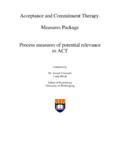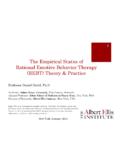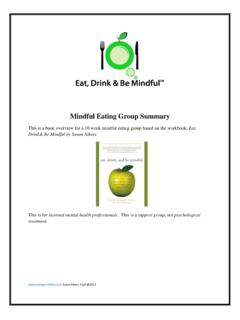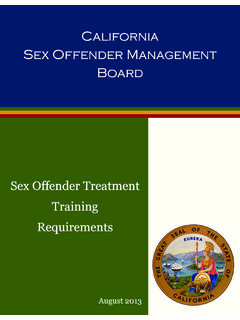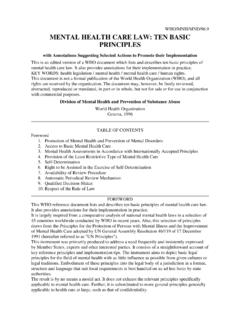Transcription of Ethics: Risk management is the name of the game
1 ethics : Risk management is the name of the game Doug Taylor 2005 Ethical issues facing counsellors is on the rise. In Queensland, the Christian Counsellors Association (CCAQ) has had to deal with four ethical issues over the past three years in its entire fifteen year history. Since ethical complaints leveled at counsellors are becoming more common, it is essential that counsellors be alert to possible ethical breaches if they wish to avoid ethical or legal consequences. In reality, can counsellors afford not to be informed and aware of unethical possibilities? In our litigious age, the answer is a big fat NO. Counsellors, who choose not to be informed ethically, are walking on the edge of a cliff leading to unprofessional conduct or malpractice. Every counsellor faces having to make difficult ethical decisions on almost a daily basis. How they make those decisions primarily revolve around three essential measures.
2 These measure include a counsellor s personal values, awareness of ethical principles, and what personal moral characteristics he or she holds to. As a rule, Counselling Associations operate under a Code of ethics or Ethical Principles (The Christian Counsellors Association of Australia [CCAA] is no exception). These ethical guidelines are designed to assist practitioners by guiding and directing their behavior as they relate to their clients. In assessing the criteria surrounding values, principles and moral qualities, it is first pertinent to clarify what is meant by counsellor or practitioner since the terms are often loosely used in the 21 st century as we hear about all types of counsellors. Generically, it refers to anyone endowed with the accountability of providing counselling and or psychotherapy services, including anyone assigned the role(s) of counsellor, psychotherapist, trainer, educator, supervisor, researcher, provider of counselling skills or manager of any of these services.
3 The second important term to consider is client. In the counselling context, a client is a general definition referring to the receiver of any services provided by a counsellor. Importantly, the client may be an individual, couple, family, group, organization or other specifiable social unit. With these two definitions in mind it is helpful to note the implications regarding the measures for effective counselling as they relate first to personal values. Personal values: This measure includes the ability to be sensitive to and aware of how one s personal values (what is considered important or of priority) as it impacts in counsellor client relationship. These important values may include a commitment to: Recognizing a client s individual rights and dignity Guaranteeing the honesty of the counsellor client relationship Striving to maintain excellence in counselling by ensuring the quality of up to date professional knowledge and its application Helping to ease the client s personal misery and suffering Promoting client self identity that is meaningful to the person(s) concerned Enhancing self and client s personal effectiveness in a wholistic manner (spiritually, physically, intellectually, emotionally, and socially) Assisting in the growth of clients developing worthwhile relationships Acknowledging and accepting the diversity of individual client human experience and culture Ensuring fairness and quality of the kind of counselling and psychotherapy services provided.
4 There is no doubt that these personal values impact on ethical principles. The values symbolize a significant way of articulating a commitment to ethical standards that are practical when expressed as a principle. Personal ethical principles: According to Corey (1996, p. 54 55), there are five basic principles that are reflected in codes that direct attention to important ethical responsibilities. Each principle is illustrated below with an example of good practice. A counsellor s responsibility is to think about all the related conditions with as much care as is realistically possible and to be appropriately accountable for decisions made. These principles are: Beneficence: Beneficence is the process of a commitment to promoting the client s well being. It is natural for clients who enter into a relationship with a counsellor to expect they will benefit from the service. This requires systematic monitoring of practice and outcomes by the best available means.
5 One reason for counsellors having to undertake clinical supervision is to ensure this important principle is adhered to. Non maleficence: Here we have a commitment to avoiding doing no harm to the client. It requires the counsellor to exercise care in staying clear of practices that may have a high risk of hurting someone, even unintentionally. This includes avoiding sexual, financial, incompetence, emotional or any other form of client exploitation. Autonomy: This principle is about respect for the client s right to be self governing. It is based on the belief that clients have freedom of thought and choice. The principle of autonomy opposes the manipulation of clients against their will, even for beneficial social ends. Counsellors are encouraged to help clients think clearly and personally weigh up the pay offs or downside of their : The principle of justice is about fair and equal treatment of all clients, and the provision of adequate services.
6 The principle requires being just and respecting individual human rights and dignity regardless of age, race, gender, ethnicity, cultural background, disability socio economic status, lifestyle orientation or religion. It involves taking into account any legal requirements and responsibilities, and remaining aware of potential conflicts between legal and ethical obligations. Fidelity: Fidelity as a principle asks counsellors to honour the trust placed in them as practitioners. This principle involves being careful not to deceive or exploit clients. It requires regarding confidentiality as a responsibility starting with the client s trust. The principle also limits any disclosure of confidential data about clients to further the purposes for which it was originally disclosed. Self respect: The British standards rightly include an additional principle relevant to counsellors, and form the basis for prevention of burnout and self preservation of counsellors.
7 This principle of self care fosters the counsellor s self knowledge and care for self. It means that counsellors appropriately apply all the above principles as entitlements for self. Including seeking clinical supervision, therapy, and other training opportunities for personal development as required. The principle supports the notion of active commitment to growth activities and relationships that are independent of relationships in counselling or psychotherapy. A counsellor s values and adherence to ethical principles are often determined by that counsellor s personal moral characteristics as they are reflected in everyday behaviour. Personal moral characteristics: The counsellor s personal moral characteristics are of extreme importance to counsellor client relationships. Some of these characteristics could be seen as describing basic counselling skills or standards.
8 Thus, it is essential that these personal qualities are deeply rooted in the individual counsellor, and progress out of personal commitment rather than the obligation of an external authority or abilities. Personal characteristics to which counsellors are urged to aspire include: Personal wholeness: the capacity to demonstrate balance in the areas necessary to show growth and personal development. The vital features of this balance include: physical (taking care of one s body), emotional (being aware of personal emotions, the ability to manage personal emotions and others emotions), cognitive (avoiding thinking errors and maintaining appropriate rational perspectives), social (the ability to relate with others equally and respectfully, respecting individual rights), and spiritually (having a sense of recognising there are things bigger than self and with a purpose and connection with God).
9 If these are demonstrated in the personal life of Jesus Luke 2:52, why not us?Empathy: the ability to communicate understanding of another person s experience from that person s perspective. This means having the capacity to step into another s shoes. Biblically, one would say this is compassion. Literally, this means to feel with another person what they feel. Jesus is a wonderful example of this principle, when he became a human, moving from his position as God to that of man :5 8. He knows what the human experience is like :17 and Heb. 4:15. Acceptance: or agape love is the quality of accepting another without judging them as a person is essential for counsellors to engage ethically with another person in pain Rom. 5:8. Congruence: Sincerity or genuineness, a personal commitment to consistency between what is professed and what is done. Integrity is a moral principle that fits aptly with the moral feature of empathy.
10 This suggests that there needs to be a commitment to being moral in dealing with others, personal straightforwardness, honesty and coherence. He is the truth John 14:6. He is the personification of vulnerability and openness. Non possessive warmth: involves respectfully demonstrating kindness, warmth and understanding by showing appropriate esteem to others and their appreciation of themselves. This characteristic works with resilience, an essential quality enabling one to have the capacity to work with the client s concerns without being personally diminished. This feature requires the ability to recognise one s boundaries. Moreover, just like Jesus, counsellors need to know when to rest Mark 6:31. Humility: another feature of Jesus life Matt. 11:29. An unassuming nature is the skill of truthfully acknowledging one s own strengths and weaknesses, vital to ethical behaviour.



